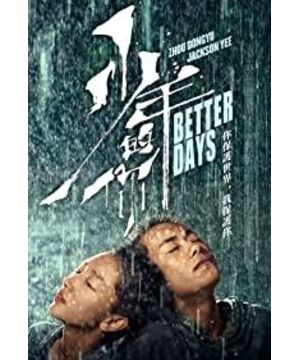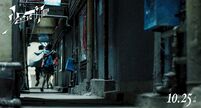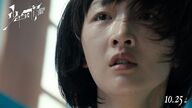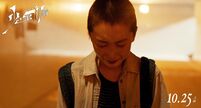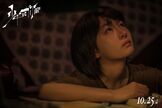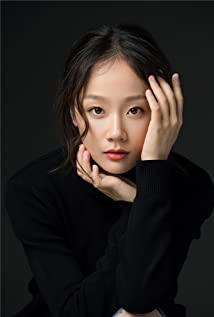"Youth of You" received almost one-sided acclaim.
As a result, criticizing it more in the current context would inevitably seem critical. If the film is positioned as a commercial genre, it is almost beyond reproach. However, it is obviously inappropriate to locate it with the currently popular attributive "realism".
"Youth of You" is more like a juvenile growth genre film with the theme of realism.
The film uses a large number of quickly fragmented clips to explain the environment background and main plot. Such a strategy, on the one hand, allows the audience to quickly enter the narrative environment, while at the same time being mobilized to automatically bridge the narrative gap between shots. For example, Hu Xiaodie's death was explained in a close-up of the character's face.
On the other hand, it also creates a fictional texture of reality. Partial smashing and collage of school and classroom scenes, as well as flashes of student body movements and facial expressions. All make the film surface the rough feeling of reality.
But if we look at this layer, it is not difficult for us to find it. The multiple appearances of this editing method largely conceal its dreamlike nature. The college entrance examination, the most easily generalized and expressive social phenomenon, is pushed to the foreground, and sharp contradictions such as juvenile delinquency, the lag of government agencies, and the problems of the original family are all vaguely conveyed in the emotional and aesthetic editing. This is undoubtedly limited by the censorship system, but we have no way of knowing the details of Xiaobei's life or the lives of other characters, and the audience's attention is quickly shifted to emotion. The emotional twists and turns of the film all depend on the performance of the actors.
"Youth of You" has the courage to choose the method of close-up to participate in the narrative of realistic themes. The characters are sanctified and emotionally charged almost overflowing the screen, allowing the audience to make emotional choices immediately. Such an approach has undoubtedly yielded excellent results. It also makes the film climax again and again, which is very attractive to the audience.
Another strategy of the film is equally intriguing. That is, the mutual reference of the images of Yi Yangqianxi and Liu Beishan. If Yi Yangqianxi is peeled off from Liu Beishan, we will find that there is not much left of this image. The sophistication and simplicity of Liu Beishan, the contradiction between calmness and recklessness, and the change in his emotional context (he fell in love with Chen Nian at the first meeting) all come from Yi Yang Qianxi's off-screen personal image. On the one hand, this satisfies the audience's expectation of vision and voyeurism to the stars, thereby covering up the fictional nature of the story and the dreamy character's feelings.
On the other hand, the film remains in a closed fictional story and screen, unable to extend further outward (reality). In watching the close-up of Liu Beishan (Yi Yang Qianxi), the audience will have difficulty distinguishing who the object of their empathy is. He kept reminding the audience that it was all just a story, a well-crafted movie.
So much so that while the film continues to pull the audience into the emotional system through editing and narrative strategies, it also constantly pushes the audience out. Because experienced audiences will consciously dissociate from the film and watch this fictitious emotional feast.
Of course, as a genre film with a realistic theme, "Youth as a Teenager" does not evade the loopholes and coincidences of the narrative, nor does it evade the commercial value of stars, and does not give up the performance of reality. Instead, mediate in it to achieve a delicate balance. This is the biggest inspiration the film brings to us.
Under the double coercion of "dancing in shackles" and "standing to earn money", Zeng Guoxiang also made his own voice.
The teenagers in the film are placed at the center of their situation, and their situation seems to be of concern to everyone. But it's really isolated. Whether it's parental absence, police lag, or teacher incompetence, teens are suspended in alarming traps. All kinds of power often come too late after the teenagers try to break free from their guilt. Therefore, we have to rebel and we have to alienate. However, after the alienation, looking back, everyone is blameless.
Chen Nian confronted the female police officer and asked, "Do you dare to give birth to your child?" In my opinion, this is what the film really touches. The rest, whether it is the education system or school violence, remain in the statement of the phenomenon, and when it goes further, it turns to the catharsis of feelings.
School violence is ultimately a social problem. What Makes Teenagers Violent? What silenced the victim? What makes repetition that should be tolerated punished, and what should be changed remains the same? The film obscurely completed the construction of the "trap", Chen Nian and Xiao Bei sat alone in the interrogation room - the focus of their eyes. But no one can be trusted, no one can ask.
The only thing that can be asked is this world, this world where young people are allowed to grow up. But what constitutes this world?
View more about Better Days reviews


